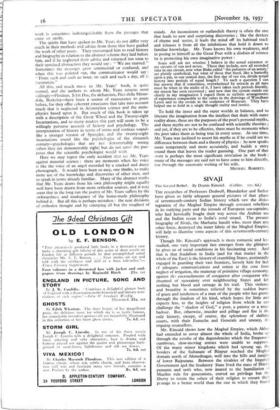SIVAJI
The Grand Rebel. By Dennis Kincaid. (Collins. 12s. 6d.)
THE researches of Professors Dodwell, Bhandarkar and Sarkar have given us fairly adequate general pictures of that phase of seventeenth-century Indian history which saw the disin- tegration of the Moghul Empire through constant rebellion in its outlying parts and the inroads of European sea-captains, who had heroically fought their way across the Arabian sea and the Indian ocean to India's coral strand. The present biography of Sivaji, the Marhatta bandit who, more than any other force, destroyed the inner fabric of the Moghul Empire, will help to illumine some aspects of this seventeenth-century history.
Though Mr. Kincaid's approach is more romantic and ks3 studied, one very important fact emerges from the glimpses he gives us of social conditions in his fascinating story. And that is that feudalism in India (and for that matter in the whole of the East) is the history of crumbling States, perennially engaged in guarding their vast frontiers, loosely knit for lack of adequate communications and rotten at the core from neglect of irrigation, the mainstay of primitive village economy, against tit; encroachments of conqueror after conqueror who dreamed of suzerainty over neighbouring States and left nothing but blood and carnage in his trail. This violence and brutality is sometimes relieved by the sudden burst, of grace and tenderness of a man of the people who has grown through the fatalism of his kind, which hopes for little and expects less, to the heights of religion from which he can challenge the " shadow of God," a poet, a painter or a trm.- badour. But, otherwise, murder and pillage and fire is th, only history, except, of course, the splendour of shiftinc courts, with their Eunuchs and Generals and uneasy, ir triguing counsellors.
Mr. Kincaid shows how the Moghul Empire, which Akb, had extended to cover almost the whole of India, broke u; through the revolts of the dependencies which the Emperor', cumbrous, slow-moving armies were unable to suppress. Of the many minor kingdoms which had sprung up, the borders of the Sultanate of Bijapur reached the Moghul domain north of Ahmednagar, well into the hills and jungles of lower Rajputana. Between the rivalries of the Imperial Government and the feudatory State lived the mass of Hindu peasants and serfs who, now inured to the humiliation of Muslim rule for generations, craved no privilege but the liberty to retain the solace of their religion to ensure their prssage to a better world than the one in which they found
themselves. A few of these Hindus had taken to bearing Moghul arms or joined the administration of local chieftains and risen high in the esteem of their patrons and been granted robes of honour and grants of land, till they themselves became petty princes and noblemen in their own rights. One of these noblemen, Shahaji, who inherited an estate lying on the Moghul border and who became a minister at the court of Bijapur, was the father of Sivaji, " the Grand Rebel," who, in alliance with popular religion and belief, with the audacity of a brilliant strategist, and with a genius for strange ruses and surprises familiar to guerilla warfare, captured one border fort after another and succeeded miraculously in shattering the Moghul Empire to pieces.
It was not the confederacy of Marliatta States which he founded, however, but a commercial movement known as the Honourable East India Company which was the true successor of Sivaji, whom, as Mr. Kincaid quotes letters to show, the Company considered its " dear friend end ally." For the city States which were to spring up at the disruption of the Moghul Empire were, like other feudal city States in the past, only partially commercial and evolved no middle class capable of improving communications and opening up the villages, and the whole economic basis of the country remained feudal through the century that followed, till the armies of John Company completed its conquest.
MULK RAJ ANAND.

















































































































 Previous page
Previous page